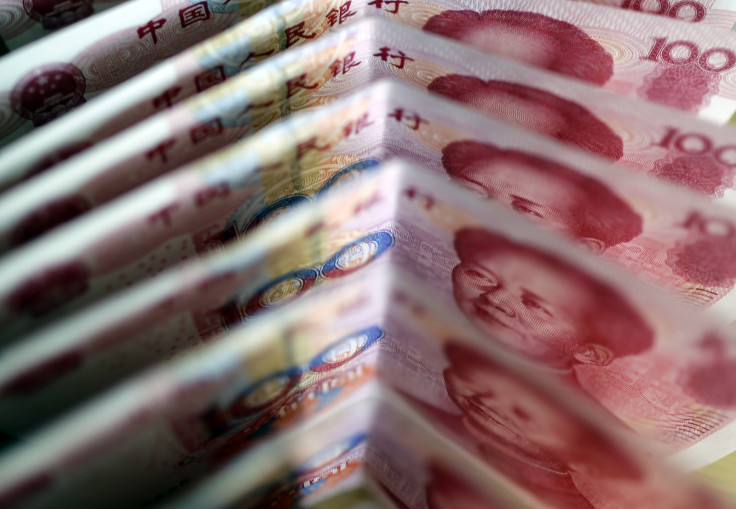Renminbi to the rescue? How the rise of China's currency could boost the British economy
London is the second-largest offshore renminbi clearing centre, but the rise of the Chinese currency threatens its FX dominance.

Chinese investment in Britain could increase in the short-term future after London became the second-largest offshore clearing centre for the renminbi, even though the UK capital's lead in the currencies-trading business is shrinking.
In March this year London, the world's largest single FX-trading centre, became the second-largest offshore clearing centre for the Chinese currency after surpassing Singapore. Britain processes 6.3% of all offshore transactions using the Chinese currency, but remains a distant second when compared to Hong Kong, which accounts for 72.5% of all renminbi payments.
The Chinese currency – renminbi denotes the currency, while yuan is the main unit, much as is the case with sterling and pound – is now the eight-most traded currency in the City, covering 1.8% of total daily transactions.
The daily value of renminbi-denominated transactions amounts to $39bn, compared with $1.9trn for the dollar and $837bn for the euro. The economic ties between China and the UK were strengthened even further in May, when the world's second-largest economy issued its first sale of offshore government debt in London.
The growing popularity of the Chinese currency could deliver a major boost to the UK economy.
"The main benefit the UK can derive from the relationship is increased Chinese direct investment in the UK, especially in infrastructure," Alexander Wolf, emerging markets economist at Standard Life Investments, told IBTimes UK.
"China has built expertise and capabilities in implementing large infrastructure projects including rail, power, and ports. With the low level of public investment in the UK and large need for infrastructure improvements, the Chinese can be a beneficial partner."
Since the turn of the decade, China has increasingly sought to attract international investors, sparking interest among financial firms in Paris, Frankfurt, Luxembourg and London. The crisis that has threatened to cripple Asia's largest economy over the last couple of years has made bilateral agreements even more important and London has won pulled clear of its main rivals.
"A series of measures have been introduced to make the renminbi mainstream since the financial crisis. This has expanded the scope for the currency and offshore clearing has become even more important for this equation," Naeem Aslam, chief market analyst at Think Markets UK, explained to IBTimes UK.
"So the importance of use of the renminbi was the main focus for the UK and London was at the heart of this conversation."
London's paramount role for commercial relationships with China became even more evident in May, when the latter issued its first sale of offshore government debt in the UK capital, borrowing RMB 3bn (£350.5m, $457m) in a deal that attracted hefty demand.
"With the low level of public investment in the UK and large need for infrastructure improvements, the Chinese can be a beneficial partner."
Then chancellor George Osborne, who had actively sought to strengthen commercial ties between London and Beijing, said the move reinforced the "UK's strong economic and financial relationship with China".
Mark Boleat, chairman of policy and resources at the City of London, said the British capital was a fairly straightforward choice for China, given the size of its financial market. Boleat added it was Britain's businesses, rather than labour sector, that stood to reap the main benefits from London's emergence as a renminbi pole in Europe.

"This [London becoming the second-biggest offshore clearing centre] means UK corporations can get the full range of renminbi products, which facilitates trade between the UK and China," he said.
"Exports to China can now be invoiced in the local currency, which gives them a better deal rather than have to receive dollars and then exchange them into pounds, and the same applies to imports."
However, the renminbi's emergence as global currency could be a double-edged sword for the UK, as it has tilted volumes towards Asia. According to a survey published earlier this month by the Bank for International Settlements, London's share in the currencies-trading business fell from 41% in 2013 to 37.1% this year, the first decline in more than a decade.
London's loss has been Asia's gain, with Hong Kong, Tokyo and Singapore all increasing their business volumes, as the combined market share rose from 15% to 21%. Boleat, however, suggested the shift in FX trading volumes was not source of concern for London.
"The emergence of renminbi as global currency and the decline in London's FX market are not a worry, as financial business and economic growth in Asia was always going to being titled to the nations in the region," he explained.
"The growth of renminbi markets in Hong Kong and Singapore does not come at London's expenses."
Brexit impact yet to be felt
However, Britain's decision to leave the European Union could have a serious impact on both London's role as main offshore renminbi clearing centre as well as to its chances of dominating the foreign exchange market.
"Brexit could make the relationship between China and the UK more feasible"
The UK capital's role will depend on the outcome of Brexit negotiations, namely whether or not Euro clearing will occur in London and if London-based banks are still the primary FX dealers and trade financiers across the continent, explained Wolf.
"If the status quo continues as so, trade financing and FX would likely benefit as European firms would use London for renminbi trade settlement and dealing," he said.
"The EU is China's largest trading partner and if more financing occurs in renminbi and London remains the European hub, it definitely creates opportunities for growth.
"Post-Brexit, if the nature of passporting and clearing in London changes substantially it's unclear how much upside there is for London as an renminbi offshore centre or if business and settlement will move."
According to Aslam, Britain's exit from the EU could even be beneficial to the relationship between the UK and China, which remains the most important market for European countries.
"There are some elements that make the possibility of China and UK relations more feasible," he said.
"But on the flip side, you have the problem that you have access to only one market as opposed to the the EU countries."
Boleat described Brexit as a minor concern, which could become an issue only if it led to less investment from China in London. "We have not seen this happening, and we expect business to expand in the future," he added.
With Chancellor Philip Hammond and Prime Minister Theresa May repeatedly stating Britain is open for business, will Chinese capitals come flooding through the door or will the rise of the renminbi ultimately prove a severe blow to London's FX market?
© Copyright IBTimes 2025. All rights reserved.






















